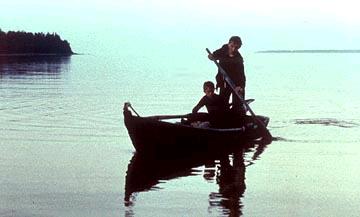The Return


In The Return, two young boys come face to face with the father they never knew. He appears out of nowhere and decides to take them on a fishing trip. The Return was Russia's unsuccessful entry for Best Foreign film (however it did win the prestigious Golden Lion Award at the Venice film festival, and it is a moody meditation on the nature of family and trust. Director Andrei Zvyagintsev is sparse with his dialogue, and prone to leave out lots of relevant information, preferring to present things as they happen rather then why. Much of the film occurs in silence, and the talking that does happen is pretty sparse. The Return opens with a bunch of boys jumping off a tall tower into the water. Ivan (Ivan Dobroravov) is too afraid to jump, and his friends taunt him, then finally leave. His older brother Andrey (Vladimir Garin) is one of these boys.
Later, the two return home to find their father (Konstantin Lavronenko, Andrjuscha) at home. They have no real memory of him, and he declares that they will be going on a trip with him. The reaction of the two boys is diametrically different. Andrey is in awe of his father. He is overjoyed that they can finally meet, and happy to do anything and everything to please his father. Ivan seems like much more of a momma's boy. He is instantly mistrustful of his father, and goes out of his way to be a baby. The father feels no need to explain himself. Zvyagintsev never explains why he left, came back, what he does now, or what he is doing when he is away from his sons. In this sense, the audience is right where the boys are. This total stranger is with them, and they are trying to learn how to deal with him.
The father's actions make him more mysterious. He is a stern authoritarian, perfectly willing to keep his children in line with a slap or two. Because of his rebellion and constant whining, Ivan is the recipient of most of the punishments, and this just seems to turn him away even more. As they spend more time together, Ivan lightens up a little, and one feels that the three are beginning to bond in their own way, yet the boys are still at a loss as to what is going on. Screenwriters Vladimir Moiseyenko and Aleksandr Novotsky (Old Hags) then throw in a catastrophic event that forces the characters to deal with something completely unexpected. Of course, telling what this is would spoil the film.
The last act is the chance for characters to achieve some sort of emotional growth, but nothing really happens. Sure, they are forced to grow up quickly and deal with new emotions, but it doesn't feel like they are any different as people. Zvyaginstev's purposeful lack of enlightenment is a double-edged sword. There are beautful shots of an island and its surrounding environs, and long glimpses at nature in lieu of dialogue. It does lend an increased aura of mystery to everything, forcing people to pay attention more. It also makes the film exceedingly dull at times, and unfortunately, this feeling manages to win out in the end.